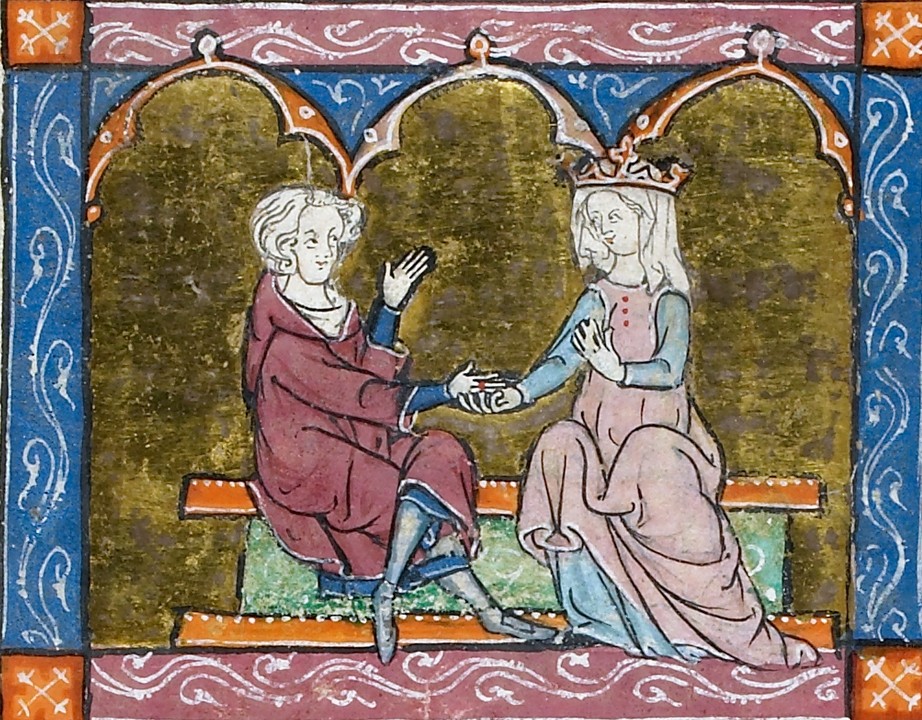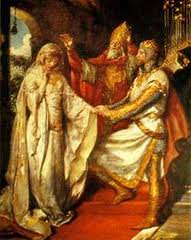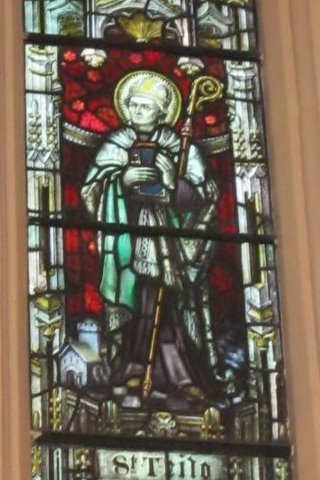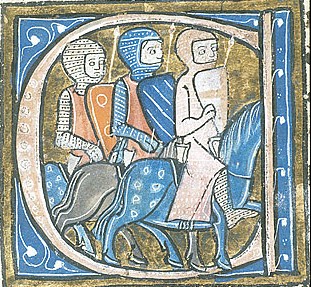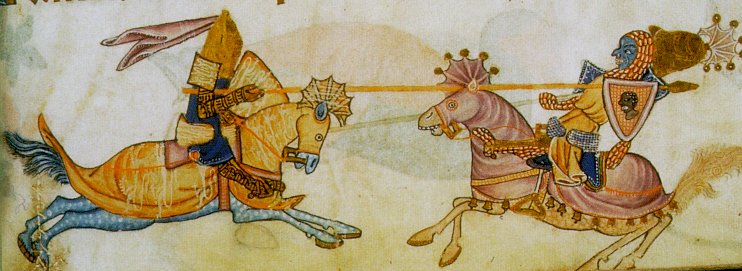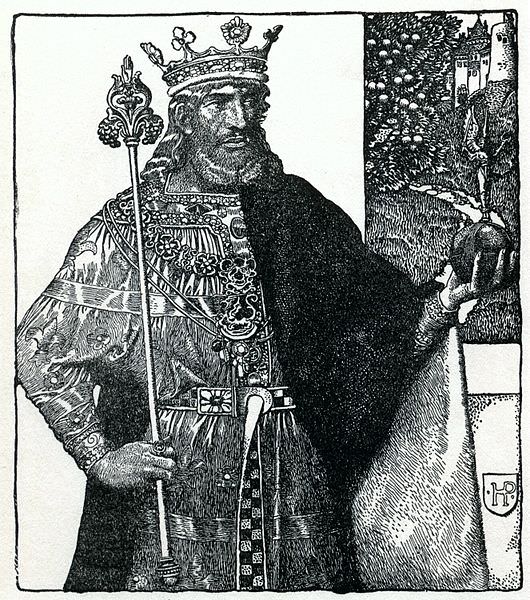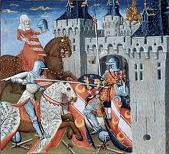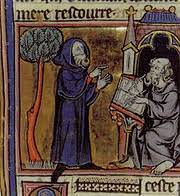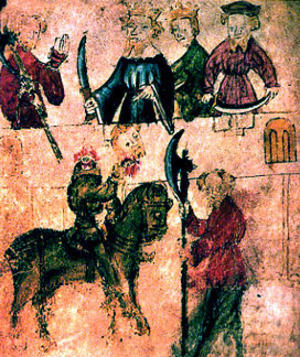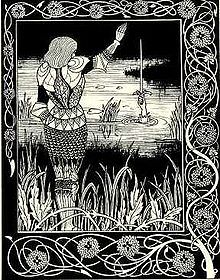The Public and Private Boundaries of Motherhood: Queen Igraine in Geoffrey of Monmouth’s Historia and Laȝamon’s Brut’
In literary criticism, awareness of transmission of tales between British and continental literature tends to encourage a view of some Arthurian narratives as more similar in tone, style, and language than they in fact are.
Lancelot Can Keep His T-Shirt
If t-shirts had been all the rage in the Middle Ages, you can bet there would have been ‘Team Lancelot’ ones selling like hotcakes. You can also bet that I wouldn’t have owned one.
The Development of Arthurian Legends
King Arthur is a well known character of literature and film, and any person on the street could probably recall many aspects of his story. However, the story that so many people know and love is the result of hundreds of years of transformation and manipulation of a legend. It did not begin with much grandiosity or with very much background information.
The millennium King Arthur: the commodification of the Arthurian legend in the 20th century
The prophesy that King Arthur will return has come true. This legendary icon of Western civilization lives again in the popular culture novels of contemporary and futuristic literature.
The uses of secular rulers and characters in the Welsh Saint’s lives in the Vespasian Legendary
This study focuses on the functional use of famous characters from the Welsh literary and historical contexts, like King Arthur and King Maelgwn of Gwynedd, in the Welsh Saints’ Lives found in the Vespasian Legendary, the most significant Welsh legendary extant, dated to ca. 1200.
Transvestite Knights: Men and Women Cross-dressing in Medieval Literature
In this thesis, I will look at mainly French and German texts from the 12th to the 15th centuries which deal with the subject of cross-dressers in the decidedly masculine domain of the knight. There are many tales of cross-dressing, particularly of women, but the concept of men dressing as women while jousting, and women dressing as knights, brings up several questions about the clothes, what it meant to be male and female, and how cross-dressing could be viewed on the tournament field.
An Examination of the Family in ‘The Tale of Sir Gareth’
This thesis investigates the theme of family interactions within Malory‘s ―Tale of Sir Gareth,‖ examining the tale itself as well as looking at several analogous Fair Unknown stories in order to determine if the theme is Malory‘s own or if it could have come from a probable source.
The Origins of the Arthurian Legend
I believe the ‘historical Arthur’ quest has, in practice, been misguided. Historians in search of him have committed themselves to a certain mode of approach. They have tried to strip away legend and isolate hard evidence
Mapping Scottish Identity in the Roman de Fergus
In the Roman de Fergus, a thirteenth-century verse romance in Old French, Guillaume le Clerc considers the consequences of Arthur’s assimilationist expansionism with a more focused attention to cultural difference and personal identity, again centered on the experience of a knight from Galloway, the eponymous
Queen Guinevere. A queen through time
According to Hopkins, “[Arthur’s] queen, Guinevere, is more elusive, less written about [than Arthur and his knights], and yet has been for centuries a central character playing a critical role in the rise and fall of the Round Table” (6). He goes on by characterizing her as “a key figure in the life of Camelot, this remarkable woman is seen variably as scholar, seductress, warrior, and dignified gentle beauty by the countless artists and writers who have depicted her. Who, then, was Guinevere?” (10) The purpose of this essay is to answer this question by looking at different texts and novels referring to the Queen.
Function and Representation of Women in Fourteenth-Century English Arthuriana
This thesis investigates the function and representation of female characters through Arthurian tropes in three fourteenth-century English Arthurian texts: Sir Gawain and the Green Knight, ‘The Wife of Bath’s Tale,’ and Sir Launfal.
Black in Camelot: Race & Ethnicity in Arthurian Legend
Examining depictions of Africans in medieval and contemporary Arthurian literature, television and film.
Lincolnshire and the Arthurian Legend
This article is intended to rectify this, proceeding from the widely-held assumption of the existence of a genuinely ‘historical Arthur’, before going on to consider the even more fundamental question of whether we ought to believe in Arthur’s existence at all.
Chaucer’s Arthuriana
The majority of medieval scholars, including Roger Sherman Loomis, argue that the popularity of the Arthurian legend in England was therefore on the wane in the latter half of the fourteenth century; as a result, the major writers of the period, such as John Gower and Geoffrey Chaucer, refrained from penning anything beyond the occasional reference to King Arthur and his court.
Mi Suete Leuedi, Her Mi Béne: The Power and Patronage of the Heroine in Middle English Romance
The Middle English Romances are somewhat difficult to study as a group. In order to examine these works accurately, one must take into consideration other literature produced at the same tirne, as well as that which preceded it.
Oh, for Shame: Public Perception and Punishment in Chretien’s Cliges
To develop this argument, a basic understanding of medieval society’s conventions is necessary in order to outline the parameters of this honor/shame culture.
The British Kingdom of Lindsey
The first piece of evidence which offers support for the above contention comes from the kingdom-name ‘Lindsey’ itself. Two forms of this name exist in Anglo-Saxon sources, reflecting two different Old English suffixes:6 Lindissi (later Lindesse, as used by Bede and the earliest manuscripts of the Anglo-Saxon Chronicle)7 and Lindesig…
A Perfect Reign of Queen and King?: An Analysis of King Arthur and Queen Guinevere in their Leadership Roles
As a literary couple that has stood the test of time, their roles as leaders, and roles in their relationship with each other reflects society’s understanding and belief of where gender roles belong in respect to leadership roles.
Breuddwyd Rhonabwy: A historical narrative?
The object of this study is the analysis of Breuddwyd Rhonabwy, which is one of the two extant Welsh prose tales about King Arthur.
Missionaries and Crusaders in Thomas Malory’s Morte d’Arthur
The War of Roses might have been the most prominent event on the English political stage at the time when the Morte d’Arthur was written, and there is evidence that Malory’s writing was in part informed by he civil discord he was witnessing.
Madness in Medieval Arthurian Literature
Whereas in the examples we have seen insanity is an obstacle to be overcome on the journey through life, for Daguenet le Fol and Merlin madness becomes the vehicle which carries them, and is constantly adapted according to need.
“La Belle Dame Sans Merci?”: Gawain’s Knightly Identity and the Role of Women in Sir Gawain and the Green Knight
It is easy to read Sir Gawain and the Green Knight as a romantic celebration of chivalry, but this romance contains a more wide-ranging, more serious criticism of chivalry than has heretofore been noticed.
The Arthur of the chronicles
Even if we cannot accept the claim made by Geoffrey in his introduction that his putative source was ‘attractively composed to form a consecutive andorderly narrative’, he certainly made extensive use ofWelsh genealogies andking-lists.
Treason and Betrayal in the Middle English Romances of Sir Gawain
This article explores the themes of treason and betrayal which are common motifs of medieval romances, specifically those featuring the Arthurian knight Sir Gawain.
Monstrous transformations: loyalty and community in four medieval poems
I will examine two forms of transformation, the werewolf transformation and the monstrous human transformation, both of which feature shape shifters who presumably cannot be trusted

